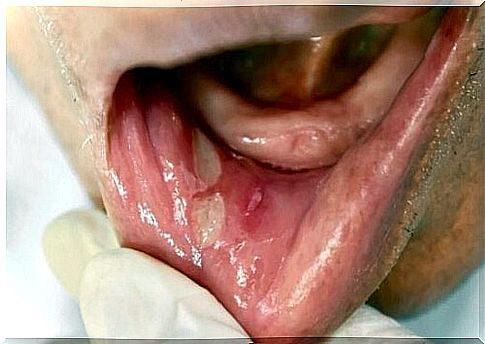Mouth Sores And Blisters: Everything You Should Know

Mouth ulcers are lesions that appear on the lips or at the base of the gums. They can also appear inside the cheeks, in the palate or around the canines.
These lesions are often painful, so activities such as brushing teeth, eating, drinking or talking can cause discomfort. The appearance of mouth ulcers is typically white, oval marks with a red area around it.
Specialists estimate that they affect about 25% of the population. They are more common in women, adolescents and people with a family history of this disorder. They are not contagious and rarely pose a risk to the health of those who have them.
Types of mouth ulcers
Mouth ulcers can be classified in different ways. If they only show up every now and then, they are acute. However, when recurrent, they are considered to be chronic. According to their clinical manifestation, they can be of three types: Larger, smaller and herpetiformis. Let’s take a closer look at them:
Bigger
Larger mouth ulcers are more than 10 millimeters in diameter and can appear alone or in groups. These mouth ulcers penetrate deeper into the tissue and usually remain there for more than a week. Some even last for several months. They can leave a scar when they disappear, and are usually located on the lips, palate, tongue, pharynx and the inside of the cheeks.
Less
Smaller mouth ulcers have a diameter of less than 10 millimeters and are the most common form. They are low and located on the side of the tongue or the inner mucous membranes of the lips and cheeks.
They cause intense pain that radiates to the adjacent areas, but most of them disappear on their own within less than a week. They appear several times with intervals in between.
Herpetiformis
These types of mouth ulcers form sores that are reminiscent of those caused by herpes. Herpetiformis are not contagious, although they tend to be recurrent. They occur in groups of several smaller wounds that are never larger than 3 millimeters. Sometimes they end up colliding to form larger lesions.

Why do mouth ulcers or blisters occur?
There are many reasons why mouth ulcers appear. In most cases, they are caused by the following triggers:
- Rubbing with uneven or broken teeth or having bitten oneself. Rubbing or other braces can also be a problem.
- Damage caused by excessive brushing or oral hygiene products containing sodium lauryl sulphate.
- Very hot foods that cause burns or burns caused by smoking.
- Reaction to certain drugs and hormonal changes caused by menstruation in women.
- Emotional stress and lack of sleep.
Sometimes mouth ulcers are caused by a deficiency of vitamin B12, zinc, folic acid or iron. They can also be an allergic reaction to the bacteria in the mouth.
There are more severe cases where these lesions are a manifestation of serious health problems such as inflammatory bowel disease, diabetes, HIV / AIDS, Crohn’s disease, celiac disease, autoimmune diseases or cancer of the mouth.
Treatment of mouth ulcers
Most mouth ulcers or blisters are harmless and do not require any treatment. They usually disappear within 7-14 days. In principle, it is appropriate to establish whether any products, foods or medicines have caused them. If so, it is best to replace these items with other products that do not cause any damage.
If they are the result of an injury, or the cause is unknown, the treatment of these wounds consists of getting used to new habits in the routine and using natural remedies to relieve the symptoms:
- Rinse your mouth with warm, lightly salted water: Three times a day for four minutes. Gargle afterwards with cold water.
- Drink plenty of fluids and avoid hot, strong, spicy, very salty foods and citrus. Of course, also avoid tobacco.
- You can use over-the-counter painkillers, such as paracetamol.
- Exercising sports or performing relaxation techniques against stress are options that remove focus from the discomfort.
- Use a soft toothbrush and go to the dentist if your teeth are in a bad condition.
In case the symptoms are very severe, the home remedies do not work or the problem becomes recurrent, we recommend going to a doctor. Maybe there is a need for more than just home remedies and a change in one’s routine.
Possible complications
The primary possible complication is that the problem may return too often or an infection may occur in the wound. To prevent this from happening, your doctor may prescribe topical oral bactericides containing chlorhexidine, hexetidine, povidone or benzalkonium chloride.
Your doctor should tell you how to use them. In some cases, doctors may even prescribe antibiotics, especially if the mouth ulcers are large or recurrent.

Prevention and recommendations to avoid mouth ulcers
The best way to prevent mouth ulcers is by maintaining good hygiene. You should brush your teeth at least twice a day, floss and rinse your mouth. One should also go to the dentist at least once a year.
A healthy, balanced diet helps prevent this disorder. If it is recurrent, it is advisable to avoid foods that can irritate the mouth, such as acidic, strong or very spicy foods. It is also important to be aware of any allergies.
Regular physical activity and performing relaxation techniques are effective measures to control stress. Although mouth ulcers usually should not be a cause for concern, in some cases they require medical attention. These are some cases to keep in mind:
- If they start to spread and gradually get bigger.
- If they cause too much pain or discomfort.
- When they last more than three weeks.
- If they look strange or leave a mark in the mouth.
We also recommend going to a specialist if the pain is very intense or these sores create additional symptoms such as fever. Sometimes these small steps are necessary to avoid major problems in the future.









